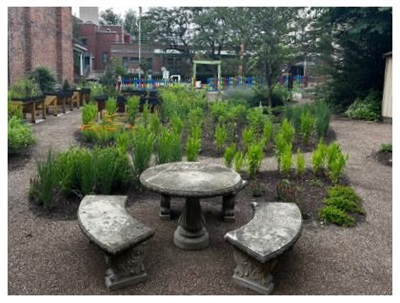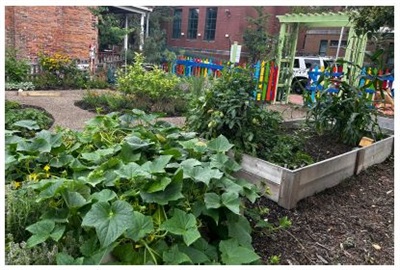Vacant Lot Greening
 Tree Equity
Tree Equity
While Pittsburgh as a whole has an average of 41% tree canopy cover, a number of disadvantaged and minority neighborhoods have only less than 20%. This inequity is a deep-rooted issue, and only worsens these communities’ health, pollution, and quality of life. Our goal is to increase canopy cover to protect neighborhoods and provide them with personalized, beautiful, and useful greenspaces that will also help protect from dangerous rises in temperature.
Additionally, this project emphasizes involving community members in planning greenspaces to ensure they meet unique local needs and foster a sense of ownership. By giving residents a voice, we can create spaces that are more engaging, sustainable, and inclusive for everyone.
Benefits of Trees
Trees provide a myriad of benefits to communities, including protection from increased heat, cleaner air, wind shields, increased quality of life, wildlife/pollinator habitat, and beautification. Trees can also have economic benefits such as energy savings on heating and cooling, increased property value, and safer neighborhoods.
Method
Vacant lots will be selected with the help of community members. Then, our partner Landforce will clear the space of any debris or garbage. Using the community’s input, a design will be selected and carried out by contractors. The lots will be permanent installations cared for by neighborhood organizations or other volunteers.

Lot Design & Community Input
Community feedback is welcomed and important to our goal. Each vacant lot has the potential to provide unique benefits depending on its community’s wants and needs. Examples of types of potential greenspaces can be found below, and new ideas are welcome! Additional personalization can include benches, pathways, or artwork!
Contact Information
To contact us about potential greenspace locations (vacant lots), designs, or tree tending/stewardship, fill out this survey or contact:
Hana Kneiser - Tree Equity Lead
City Forestry
Frequently Asked Questions
How do I know if my neighborhood is eligible?
Eligible neighborhoods are classified as Justice 40 by the U.S. Environmental Protection Agency. Justice 40 neighborhoods will appear purple on the map found at J40 Citywide - Google My Maps.
How can I get involved?
If you have questions or information about vacant lots, reach out by email or phone to Hana Kneiser (contact information above).
What kind of lots qualify?
Any vacant lots that are owned by the city or that are able to have ownership transferred to the city or a trusted community organization are eligible.
Who is paying for this?
All expenses will be paid for through an IRA grant and volunteers from various Pittsburgh Canopy Alliance organizations will assist with other support needed.
How will maintenance be handled?
For the purpose of green job building, our goal is to turn stewardship over to your local community organizations. We have partners who will help facilitate training of tree tenders and initial maintenance.
Examples of Types of Greenspaces


*Photos courtesy of Tree Pittsburgh & Western Pennsylvania Conservancy
- Sensory gardens stimulate the senses of touch, sight, smell, and taste. They can include vegetable beds, fruit trees, flowers, and interactive art installations such as instruments and interesting textures.
- Shady groves of trees provide a beautiful environment to relax on soft grass or a bench while taking in the greenery.
- Reflection gardens honor historic people or events with related tree species or art installations such as murals.
- Fruit tree orchards provide fresh food to neighbors and wildlife, promoting biodiversity and food security.
- Pollinator gardens increase biodiversity while beautifying spaces with native flowers.
- Micro-forests are densely vegetated lots that emulate larger forest ecosystems. They require little maintenance while offering significant benefits to the neighborhood.
Have another idea? Let us know!
Partnerships
Tree Pittsburgh
Community outreach will be led by Tree Pittsburgh, which works to restore and protect the urban forest through tree planting, education, advocacy, and land conservation.
Landforce
Clearing of vacant lots and preliminary construction will be handled by Landforce, which invests in communities through career training and land stewardship.
UrbanKind Institute
Another outreach partner is the UrbanKind Institute. The UrbanKind Institute is committed to bridging the gap between community experiences, public policy, program evaluation and academic research, bringing different people and ideas together.
Street Tree Investment Plan
From the Pittsburgh Shade Tree Commission: The Pittsburgh Shade Tree Commission’s Equitable Street Tree Investment Strategy will identify low-income/low-canopy neighborhoods, support education on urban forests, develop tree care infrastructure, plant trees, and fund maintenance schedules to improve the quality of life for current and future residents.
last updated: 24/04/2025